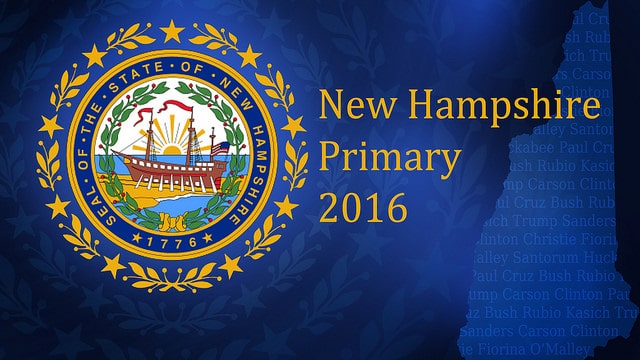Bill McCormick and Dan Dixon collaborated on this piece from TJP’s New York Office (two laptops on a kitchen table in the Bronx).
Two primaries down…dozens to go. [sigh] Here we offer five quick take aways from Tuesday’s primary in New Hampshire. We hope they will enrich water-cooler conversations from sea to shining sea. The first is fairly obvious:
1. Sanders and Trump Won
For the details, see here. To compare that to the most reliable predictions, see here and here. And yet despite their apparent victories…
2. New Hampshire Didn’t Narrow the Field
Conventional wisdom holds that the Granite State narrows the field. That did not happen. While Iowa encouraged the perception of a GOP three-way race between Cruz, Trump and Rubio, New Hampshire muddied that picture, with Trump returning to the top, Kasich surging to second, and Cruz, Bush and Rubio jostling for third place. Notably, Cruz, Bush and Rubio were within 1% of each other. In a New Hampshire first, five candidates each garnered 10% or more of the vote.
Christie, Fiorina and Carson brought up the rear. This is particularly disappointing for Christie, who seemingly cut Rubio down without building himself up. Perhaps Christie has been Trump’s biggest victim.
The stakes are different for Democrats. By most projections, Clinton could have afforded to lose both Iowa and New Hampshire. Having won one, now she needs to confirm the prevailing wisdom that she can outpace Sanders for most of the remaining primaries. So does that mean NH was…
3. A Rejection of “The Establishment?”
The media narrative following New Hampshire will be fairly clear: the vote in New Hampshire is a negative reflection on the “Establishment.” Whether conservative or liberal, anyone with ties to Washington is simply unacceptable.
On the Republican side, the “Establishment” candidate Rubio had a disappointing finish in New Hampshire. It seems Chris Christie’s attack at the last debate may have hurt him.
Another reason is that 50% of NH voters have said they wanted a political outsider, and of this group, 57% support Trump.
As for the Democrats, 33% of voters ranked “honest and trustworthy” as their most important quality (92% voted for Sanders) and 25% “wanted an outsider” (89% for Sanders.
Trump and Sanders both claim that they are the candidate of the common person, with Bernie pushing the issue of campaign-finance reform. Bernie’s grassroots fundraising raised over $20 million dollars in January, almost all of which came from online donations averaging $27 apiece (yes: $27, not $27,000). And Trump regularly reminds voters that he is “self-funded.”
This approach resonated in New Hampshire. But will it be as important in other states going forward? It is difficult to say, since…
4. New Hampshire Is Not Indicative of the Entire Country
It says a lot about New Hampshire that the state was the great hope of Bernie Sanders and the “Establishment” Republicans: these are candidates who are only likely to do well in specific places.
Much ink has been spilt about New Hampshire’s demographics, and rightfully so: it is unusually white (94%!!), and politically independent. (Although admittedly “independent” doesn’t mean what you think it does.)
Sanders did exactly what the polls suggested he would do. But his clear victory in New Hampshire does not make him the favorite for the Democratic nomination. In fact, he is still a significant underdog in almost all upcoming states. Here are the current FiveThirtyEight polling averages in select states for Clinton and Sanders:
| DATE | STATE | CLINTON | SANDERS |
| 2/20 | Nevada | 50.3 | 28.1 |
| 2/27 | South Carolina | 60.5 | 29.3 |
| 3/8 | Michigan | 59.9 | 29.0 |
| 3/15 | Florida | 61.0 | 26.0 |
| 3/15 | North Carolina | 55.9 | 28.3 |
| 3/15 | Ohio | 52.8 | 38.6 |
| 4/5 | Wisconsin | 45.6 | 43.4 |
| 4/26 | Pennsylvania | 51.4 | 28.0 |
| 6/7 | California | 46.3 | 32.9 |
All of which reminds us that…
5. The Race Isn’t Over
The primary process, like much of U.S. politics, encourages us to focus on the short-term, on particular events and their immediate outcomes. But one primary is just that: one primary.
No one has won the election. No one has even won Iowa or New Hampshire! Trump and Sanders had very good nights in New Hampshire. But Iowa teaches an important lesson.
These first contests are proportional rather than winner-take-all. You can say Cruz “won” Iowa, but he actually got 27.6% of the vote, which meant 8 delegates out of 44. You can also say Trump and Rubio “lost,” but they walked away with 7 delegates each. Hillary “beat” Sanders, but he still had 21 delegates to her 23.
Why does this matter? More primaries than not award delegates proportionally, meaning a candidate can build up a stockpile of delegates without any flashy victories. Indeed, there have been interesting models showing how a candidate like Rubio might start out mildly but sustain a steady pace to win the nomination.
What is more, the nominations are still months away, we’ve numerous primaries to go, and anything can happen between now and then. As one wag said recently, “This is politics, so any one of them could slip on a banana peel tomorrow.” We here at TJP will be watching, because as George Bluth reminds us…
–//–
Title image by Flickr user DonkeyHotey is available here.


